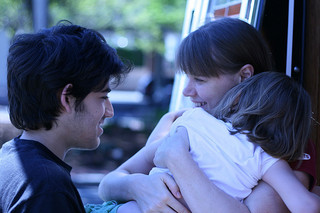For the background to this post, here is Chris’ first post, Ryan’s quite complex and important response, and Chris’ second post.
Before all this was a Twitter exchange. Chris tweeted saying there was a special place in hell for me three days before his post. I ended up calling him a dick, for being a dick to Nick Bilton, after which he wrote the now infamous post that kicked all this off. I hope in vain that this post may close the conversation.
The internets have been abuzz with the talk of whether Chris Soghoian’s attack post on me (and other journalists) was, among other things, sexist. After a litany of faults, put downs, and misunderstandings, this one question has emerged above all others. So let me address whether Soghoian was sexist towards me.
Of course he was.
But perhaps not the way the vast majority of people think of sexism. I have no idea if Soghoian has a problem with women, per se. But I have a problem with perpetuating an environment so hostile to women that most leave and the ones that remain often describe their own careers as “traumatic.” This is what Soghoian has done, and this is sexism in its most pernicious form.
I don’t know (nor am significantly concerned) what Soghoian was thinking when he attacked me. He has stated he doesn’t hate women journalists. But there’s more than intention to sexism, whether my gender fueled those intentions or not. Sexism isn’t merely the stance: the sexist mind, where one denigrates women deliberately in thought and word. It is also the performing of sexism, which requires very little consciousness and does the majority of damage. When someone like Soghoian chooses a target for a political attack, he chooses for maximum impact, and hopefully little harm to him. The fact that women are less supported in tech makes us easier targets. And we are — given any arbitrary level of accomplishment, attacking women is safer than attacking men. When Soghoian patronizes us, he reinforces this relative weakness. In short, he performs sexism. He can be assured of the support of overt sexists, which he received in his post’s comments, and that others will be loath to weigh in.
The performance of sexism and racism is almost always all upside for the performer. It’s generally too subtle to be criticized, guarantees a constituency no matter how odious you may find that constituency, and melds in seamlessly into an environment of sexism like one more violin in the string section — ultimately strengthening an anti-woman culture. And this is exactly what Soghoian did by adopting a patronizing and disrespectful tone during his take down on me.
In this specific case, after leading with the technical inadequacy of journalists, Soghoian ran into a problem with me. I am not, as one would get the impression from how Soghoian structured his attack, a technical illiterate. I didn’t get a quote explaining the biggest flaw in Cryptocat from any of Soghoian’s favorite men, which he criticized me for, because I didn’t need to. I can explain that a hosted Javascript application is vulnerable to a deep structural attack better than any of them — I explain things for a living. Each time you go to the site and re-download Cryptocat, the only assurance you’re getting the right code is SSL, the encryption layer of web communication which is signaled to users by the lock icon in their browser. But SSL is broken, and relying on it is a design flaw for Cryptocat. The fact is, I covered the flaws. I agreed with Soghoian and others about what the worst problems were, and not only restated that the software was experimental, but that the author himself wouldn’t bet his life on it. That statement, more than any mention of HTTPS stripping or man-in-the-middle, was there to tell real people with real problems that they shouldn’t bet their lives either.
Soghoian practices talking down with the skill of an artist. Robbed of actual technical insufficiency on my part, he could only imply it, and switched to criticizing my writing. He said I placed the technical details too low in the article, implying that my readers wouldn’t read that far.
I am a long form, literary non-fiction writer who specializes in technical subjects. I write whole articles, I write them with my whole heart, and I work damn hard to keep my reader engaged. It does hurt to have Soghoian cleverly talking down to me on a technical level when I may very well know more than him. To go on to subtly insult my ability as a writer is not only contemptible, but an unqualified attack.
I have to spend time unwinding these assumptions about my skills every day I interact with the community I cover. I have explained that I am no one’s girlfriend more times than I can count. I have to tell people to stop dumbing down when I enter a conversation. In the 19 years that I have socialized with, worked in, lived with, and eventually came to write about the tech community, I have come to terms with disrespect and patronizing towards women that is simply breathtaking. The attitude is how this is performed. Sexism isn’t merely present, it is the water we swim in.
This doesn’t mean that it’s impossible to criticize women in technology without being sexist. But it is a bit harder. The tool you have to give up when criticizing women who have been talked down to all their lives, if you want to avoid performing and therefore reinforcing sexism, is talking down to them. For a man in tech, speaking down to a woman in public is a fundamentally different act than speaking down to another man. (Bringing up appearance, dating, or sex, while not applicable in this case, is equally problematic.)
And before anyone says that’s not fair, I’ll point out there’s a lot of not fair here to go around. If you want someone to blame for that, don’t start with either the men who have stepped forward to call bullshit when they see it or the women who stand up for themselves in an environment that can often feel like a lion’s den. If you want someone to blame for the fact that you can’t patronize women without performing and reinforcing sexism, blame the rich history of sexism that created the situation we find ourselves in now.
Context matters. If you have two men working for you, and one is white, and the other a person of color, it means something different if you call the latter “boy”. What might sound affectionate to the former is likely to sound like hundreds of years of oppression to many people of color. So just don’t ever do that. We learn these things.
If you want to deliver a cogent, non-sexist criticism to a woman in a non-traditional field that doesn’t reinforce nasty cultural norms, (which we need as much as the next person) you have to take the rhetorical tool of patronizing them out of the tool kit. Speak respectfully and recognize their achievements in public. It’s not too much to ask.
If, as has been suggested to me by several people, this is the only tone Soghoian has, we might consider that this as a personality flaw would run deeper than mere sexism. A person who is unable to adjust to circumstances or speak with a compassionate and deliberate argument is not a good person to be. I prefer to think that this isn’t who Soghoian is, but rather that, soaking in an environment of sexism, he performed it unknowingly.
Everyone knows that sexism runs rife in tech. Yet no particular instance of it can be spoken about without recrimination towards the speaker. This is not the way to make things better. Instead, Soghoian should publicly apologize to me, and then we all should forgive him his outburst. I doubt that this will happen, but it would help the community if it did.


